Article MT185
Walter and Daisy Bulwer
Recollections of the Shipdham musicians by members of their community
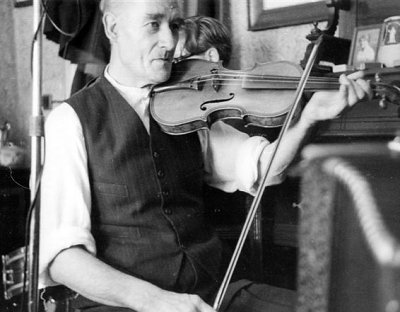
The music of Walter and Daisy Bulwer of Shipdham in Norfolk will be familiar to most Musical Traditions readers, as will the story of their 'discovery' by Mervyn Plunkett and the subsequent influential English Country Music recordings of the early 1960s. 1 Over fifty years after they stopped playing in public, and over thirty years after their deaths, they are still fondly and proudly remembered by residents of Shipdham and the surrounding area. It is largely the reminiscences of these locals that make up the information contained in this article.
1 Over fifty years after they stopped playing in public, and over thirty years after their deaths, they are still fondly and proudly remembered by residents of Shipdham and the surrounding area. It is largely the reminiscences of these locals that make up the information contained in this article.
Walter William Bulwer was born in Shipdham on 4 December, 1888. The 1901 census lists him, aged 12, as 'scholar'. His older brother John Chamberlain (born 9 May, 1886) is entered as 'Post Office assistant', aged 14. Their father William died in about 1899 and their mother Alice is described in the census as 'dressmaker', aged 43, although she also ran a grocery and village shop, presumably in the large cottage (now known as Bulwer Cottage) where she continued to live in her old age with Walter and his wife Daisy, after she had retired and they took over the business sometime in the 1920s.
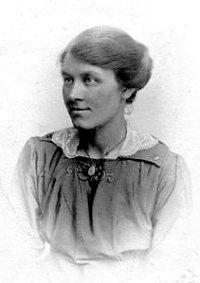 Daisy Dora Hart came from the neighbouring village of Bradenham, was born about 1892 and is described in the census as aged 8 in 1901. Hart is a very common surname in Norfolk and it is difficult to be absolutely sure who her family might have been. Of the Harts who were living in Bradenham in 1901, Mary Ann (53) and George (52; described as 'farmer') are the only likely people to have been her parents, but there are also Ellen (18 - 'domestic servant'), Katherine A (5) and Dorothy (5 months), as well as Sidney (23 - 'farmer's son'), Herbert (16 - 'yardman on farm'), George W (36 - 'journeyman baker'), William (62), Walter (17), Herbert H (16) and George (60), all described as 'agricultural workers', and George (32 - 'teamman on farm'). Even in that age of prolific child-bearing, it seems unlikely that Mary Ann was the mother of baby Dorothy, but she may well have been Daisy's. To confuse matters further, at least one Shipdham resident is convinced that Daisy was an orphan.
Daisy Dora Hart came from the neighbouring village of Bradenham, was born about 1892 and is described in the census as aged 8 in 1901. Hart is a very common surname in Norfolk and it is difficult to be absolutely sure who her family might have been. Of the Harts who were living in Bradenham in 1901, Mary Ann (53) and George (52; described as 'farmer') are the only likely people to have been her parents, but there are also Ellen (18 - 'domestic servant'), Katherine A (5) and Dorothy (5 months), as well as Sidney (23 - 'farmer's son'), Herbert (16 - 'yardman on farm'), George W (36 - 'journeyman baker'), William (62), Walter (17), Herbert H (16) and George (60), all described as 'agricultural workers', and George (32 - 'teamman on farm'). Even in that age of prolific child-bearing, it seems unlikely that Mary Ann was the mother of baby Dorothy, but she may well have been Daisy's. To confuse matters further, at least one Shipdham resident is convinced that Daisy was an orphan.
Whatever the uncertainty about her family, it is certain that she met Walter during the First World War. Walter was born with one leg withered and much shorter than the other one and he could only get about on crutches. Being unable to be in the armed forces, he was involved in war work in an engineering works in East Dereham, often walking the four miles each way on unpadded ash wood crutches, although he also often lodged in the town with the cousin of Steven Chenery, a Shipdham resident and close family friend. It was whilst he was working in Dereham that Walter and Daisy met and they were married on 22nd December, 1916.
From a very early age, music was a big part of Walter's life. His father had taught both him and his brother to play the violin and read music. His first public performance was on the chancel steps of Shipdham church, which Walter recalled later: "A farmer came up to me after the service and gave me a gold guinea for doing so well. I always treasured that". By about 1910 he was playing regularly for dances around the area and in 1935 Walter became leader of a regular dance band, called Time and Rhythm, based in the village and still fondly remembered by a great many people today. The band lasted until the mid fifties, with Walter mainly playing fiddle and Daisy piano. Other members included Reggie Rix (fiddle and mandolin), Horace Everett (fiddle and cornet), Mr Clements (drums), and Lily Codling (piano accordion). The band played a mixture of the old-time country dances, such as the Heel and Toe Polka and the Veleta, as well as the more recent dances of the day, and seem to have had a singer called Billie Wade for some of the time. In the village, they played regularly in rooms above Head's Hardware shop and sometimes above Riseborough's garage, which was also used as a cinema.
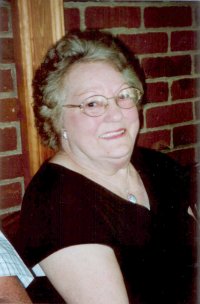 Lily Codling, the only surviving member of the Time and Rhythm band, who played with them as a teenager, recalls that, "We did have some good times. The best times we used to have really was at the garage where Ponder're now got (then Riseborough's). There was an upstairs room there; we used to go up there and play. And his favourite really was In And Out the Windows … We used to start off with a polka, The Dot Polka,
Lily Codling, the only surviving member of the Time and Rhythm band, who played with them as a teenager, recalls that, "We did have some good times. The best times we used to have really was at the garage where Ponder're now got (then Riseborough's). There was an upstairs room there; we used to go up there and play. And his favourite really was In And Out the Windows … We used to start off with a polka, The Dot Polka,  2 and finish up with The Heel and Toe Polka. And they was his two favourites, really. And The Girl I Left Behind Me…But I did enjoy quite a lot of time down there … The name of it was Can You Dance the Polka? One, two, three, he used to bang his old foot on the floor for the hop, one, two, three and a hop, and that was what Walter used to do. And Daisy used to clap her hands … All the schottisches, and there's another one they used to play, the Samba. Then we used to play where you used to have to go up and find a partner, then if there was someone without a partner, the one in the middle would touch someone's shoulder and you had to let them go and they danced on. That was a popular old dance then, as a matter of fact, in Bulwer's time. So everybody had a dance; you didn't have to sit there, but you all started off with a partner, but if you tapped somebody on the shoulder, they've got to find someone. They called that Shoulder Tapping…"
2 and finish up with The Heel and Toe Polka. And they was his two favourites, really. And The Girl I Left Behind Me…But I did enjoy quite a lot of time down there … The name of it was Can You Dance the Polka? One, two, three, he used to bang his old foot on the floor for the hop, one, two, three and a hop, and that was what Walter used to do. And Daisy used to clap her hands … All the schottisches, and there's another one they used to play, the Samba. Then we used to play where you used to have to go up and find a partner, then if there was someone without a partner, the one in the middle would touch someone's shoulder and you had to let them go and they danced on. That was a popular old dance then, as a matter of fact, in Bulwer's time. So everybody had a dance; you didn't have to sit there, but you all started off with a partner, but if you tapped somebody on the shoulder, they've got to find someone. They called that Shoulder Tapping…"
Lily Codling would mainly play piano accordion, but also piano on occasion: "But when Daisy didn't do it, I would do it…I remember there used to be two mirrors (in the room above Riseborough's garage); that weren't a very nice place because they used to do cars up there. But that was right near Walter's home weren't it?...I used to go down and practice with them". On one occasion, Lily was caught out, having used the pretence to be at the Bulwers' house for a practice to go out dancing: "Well then, one night we wanted to go out to a dance so I hung my music  3 up in the toilet, on the back of the door. They were outside toilets. Course, who should walk from Carbrooke? Tom did. (Her fiancé). He went in the toilet; my music fell down off the door. So he said to my mother, "Where is Lily?" She said, "She's gone down Mrs Bulwer's; they've got a practice on". He said, "Next time she goes, she'd better take her music!"
3 up in the toilet, on the back of the door. They were outside toilets. Course, who should walk from Carbrooke? Tom did. (Her fiancé). He went in the toilet; my music fell down off the door. So he said to my mother, "Where is Lily?" She said, "She's gone down Mrs Bulwer's; they've got a practice on". He said, "Next time she goes, she'd better take her music!"
"Cause, if there was anything to go (tunes needed for certain dances), Walter would find it. He was wonderful. He used to know everything you could know, but he used to like the polka. I think he made more noise when he done the polka … He was good; he was a very good musician. When I used to play with him, Daisy played by music. I could read music and I could play by music, but whatever Walter played, I played with him, but I didn't have any music. But we used to put it up there, to make out I was playing, because Daisy didn't like it! Daisy played the piano, which I give her credit, I call her a musician … because she played what was written. I bet there wasn't a bit of music you could put in front of her that she couldn't play … She used to say to me, "Now, make sure!" because she was a bit sterner than him. "I'm playing in C, I don't want you goin' in F and G. I'm playin' in C". Cause, her style of music wasn't mine. I used to syncopate and vamp and Daisy was strictly music. No matter how many notes was on the music, Daisy wouldn't miss one … I have played the bottom (of the piano), she have played the top, and then she used to say to me sometimes, "I'm not havin' you up there!" I used to have to do what she told me! But he used to laugh and put his eyebrows up."
Walter was certainly a man given to jokes and good humoured tales, as Shipdham resident Willie Risden recalls: "And every time you saw him, you'd say, "How're you doing, Walter?" That was always, "Hot and dry" if that was summertime, or "Cold and hungry" if that was the winter. 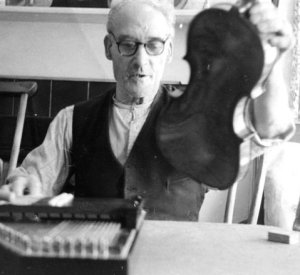 And as regards to telling you the yarns, well, I'll leave it to you to decide what yarns he used to tell!" This jokiness was evident in public performances too. Two postcard sized dance band advertisement cards have survived, on the back of each is a long list, in Walter's handwriting, of first lines and aide memoirs of jokes and funny tales, presumably told at certain times of the evening, between tunes and dances. Also, as Lily Codling remembers: "But plenty of times, Daisy used to play with her old wool tammy on. Walter used to get the old violin stick and poke her hat. "Walter, stop it now!" And he used to look around, because he was a humorous old boy. Oh yes, he was lovely."
And as regards to telling you the yarns, well, I'll leave it to you to decide what yarns he used to tell!" This jokiness was evident in public performances too. Two postcard sized dance band advertisement cards have survived, on the back of each is a long list, in Walter's handwriting, of first lines and aide memoirs of jokes and funny tales, presumably told at certain times of the evening, between tunes and dances. Also, as Lily Codling remembers: "But plenty of times, Daisy used to play with her old wool tammy on. Walter used to get the old violin stick and poke her hat. "Walter, stop it now!" And he used to look around, because he was a humorous old boy. Oh yes, he was lovely."
Because Daisy used to prefer to play from music, Walter used to paste medleys of tunes together for her onto boards, as Lily Codling recalls: "What he used to do for Daisy; what happened to them, I don't know; 4 there'd be the music on, for her there, then the next tune, and the next tune, and they'd all be on a board. So instead of Daisy having to turn over, or find another bit of music, Walter'd got that all sussed out. That's what he done. I tell you what they had one night: there was Daisy, Daisy, Dickey Bird; there was about four. And you see, the sheet music then, that weren't right big like that is now, you know. He had some smaller sheet music than that. So, well, that's what he used to do for her. Only when they went to the dances, instead of Daisy having to keep turning over, picking up another bit, they could carry on … He knew what he was doing, like Daisy, Daisy, Dickey Bird, Bull and Bush. Nobody stopped dancing."
4 there'd be the music on, for her there, then the next tune, and the next tune, and they'd all be on a board. So instead of Daisy having to turn over, or find another bit of music, Walter'd got that all sussed out. That's what he done. I tell you what they had one night: there was Daisy, Daisy, Dickey Bird; there was about four. And you see, the sheet music then, that weren't right big like that is now, you know. He had some smaller sheet music than that. So, well, that's what he used to do for her. Only when they went to the dances, instead of Daisy having to keep turning over, picking up another bit, they could carry on … He knew what he was doing, like Daisy, Daisy, Dickey Bird, Bull and Bush. Nobody stopped dancing."
The Bulwers were certainly very active with their music making, but are also greatly remembered in Shipdham in their role as newsagents and shopkeepers. Having carried on this trade from Walter's mother since the 1920s, the pair ran a thriving business from their cottage. Walter would deliver newspapers around Shipdham and Bradenham in his black Austin 7, his walking disability not seeming to hamper him; with no kerbs he was able to drive up close to many houses and push the papers through from the car window. He was also adept at straddling low garden walls with his crutches, to take the papers from house to house. Daisy would deliver the papers to neighbouring Cranworth by bicycle, as Willie Risden recalls: 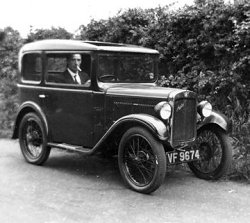 "And I can see her now! Her old mac she had on, that had a band; when she took the cash bag off, the old mac had seen so many storms, and when she took that off that left that band around the waist."
"And I can see her now! Her old mac she had on, that had a band; when she took the cash bag off, the old mac had seen so many storms, and when she took that off that left that band around the waist."
Walter's car is fondly and vividly remembered by older Shipdham residents, being one of the few in the village at that time. Several people proudly recall that the number plate was VF9674 and Willie Risden adds: "But the car. I was telling you he had three engines put in it; he just used to wear one engine out stoppin' and startin' or changing gears, and of course the bodywork was still good, you see. And Sonny Hudson, who worked for Riseborough, was telling us the old bugger used to stand over him all the while, while they were changing the engine." Peter Woodcock remembers one winter accident: "In 1947 … that was a very severe winter. He was on Blackmer Row corner and he delivered the papers down Cranworth because that was too rough for Daisy, and he turned it over onto its side on Blackmer Row corner. He crawled out through the little canvas two-by-three sunshine roof…he crawled out of that and he come on his crutches down to Riseborough's to tell them he'd turned the car over. All he'd done was cut his nose. And Sonny Hudson went up there to the car, pushed it back onto its wheels, started it and drove it back to Shipdham. Hardly a mark on it!"
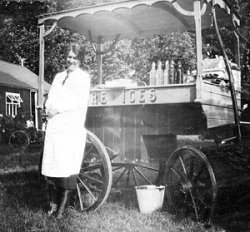 Another line was in ice cream and sweets, prompting a young Lily Codling to be a regular visitor: "He had a little old shop in the village, you see. His house, there was a little shop there. But all for a penny. Oh, you could go and get bagfuls. But I did spend a lot of time down Mr Bulwer's
Another line was in ice cream and sweets, prompting a young Lily Codling to be a regular visitor: "He had a little old shop in the village, you see. His house, there was a little shop there. But all for a penny. Oh, you could go and get bagfuls. But I did spend a lot of time down Mr Bulwer's  5 because he used to keep giving me plenty of ice creams…and Daisy used to say to me: "I've got you your lemon". She used to fill a glass of water, and squeeze the lemon in and put some sugar in. I thought that was quite a treat really! Cause they didn't have any family and when I used to go round there, he used to say to my mother, "Here come my adopted daughter!" I spent a lot of time with them. And she used to bake cakes and she'd give me a cake. She used to say to me, "When you come out of school, you come and see me again". Later on, every Saturday morning Daisy and Walter used to call at my mother's in Market Street, when they collected the paper money, they always had their cup of tea and one of my mother's cakes. Always stopped there. I can remember what he once done for me, as a little girl. There used to be whips and tops. He cut me one out and made me a top … and I'd spin it lovely."
5 because he used to keep giving me plenty of ice creams…and Daisy used to say to me: "I've got you your lemon". She used to fill a glass of water, and squeeze the lemon in and put some sugar in. I thought that was quite a treat really! Cause they didn't have any family and when I used to go round there, he used to say to my mother, "Here come my adopted daughter!" I spent a lot of time with them. And she used to bake cakes and she'd give me a cake. She used to say to me, "When you come out of school, you come and see me again". Later on, every Saturday morning Daisy and Walter used to call at my mother's in Market Street, when they collected the paper money, they always had their cup of tea and one of my mother's cakes. Always stopped there. I can remember what he once done for me, as a little girl. There used to be whips and tops. He cut me one out and made me a top … and I'd spin it lovely."
Another sideline was cutting hair: "You'd get a short back and sides, that's what he'd give you if you went there - there was no sort of variation". And Walter was a skilled taxidermist, with the downstairs of the house filled with various stuffed animals: "He was telling me one day he was skinning an old harnser, which we know is a heron, and found a dead rat in it!" as Willie Risden recalls. 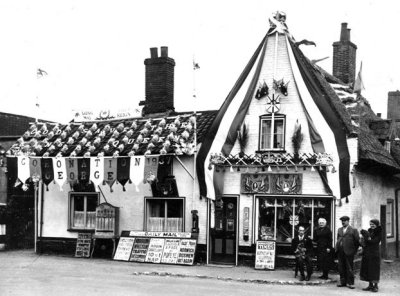 A man of many talents, Walter was also very skilled with fretwork and may well have repaired instruments regularly, as a book on violin making and repairs once belonging to him forms part of the collection of Gressenhall Farm and Workhouse museum of local rural life.
A man of many talents, Walter was also very skilled with fretwork and may well have repaired instruments regularly, as a book on violin making and repairs once belonging to him forms part of the collection of Gressenhall Farm and Workhouse museum of local rural life. 6 In addition, there is the well-known story of him winning a prize for decorating his cottage for the coronation of George VI. Willie Risden again: "I remember, in the coronation of, that'd be George VI, he won a prize for decorating his cottage. And that was really decorated. That was from top to bottom. To see him go up a ladder, with one useful leg and the other useless, was a sight worth seeing. Not only done from the floor to the gutters, he done the gable as well."
6 In addition, there is the well-known story of him winning a prize for decorating his cottage for the coronation of George VI. Willie Risden again: "I remember, in the coronation of, that'd be George VI, he won a prize for decorating his cottage. And that was really decorated. That was from top to bottom. To see him go up a ladder, with one useful leg and the other useless, was a sight worth seeing. Not only done from the floor to the gutters, he done the gable as well."
One main line of work, which Walter kept up until late in life, was tailoring. He was highly regarded as a man who could mend garments so you couldn't see the repairs and the West Norfolk Foxhounds used to take their red jackets to him when necessary. Lily Codling again: "He'd alter clothes lovely; he was a good tailor. You wouldn't have to fit nothing much on. He'd only want to look at you. And I remember, when I'd finished with them, I would be about fourteen or fifteen then, I went in the Cranworth Dance Band, and we had to wear black and white. The three men who played in it wore white shirts, black trousers and bow tie … He said, "I'll make you a dress". I said, "You can't make me a dress". He said, "Yes I can!" He said, "Daisy've got some black dresses. I can cut them all to fit you". I said, "Well, I only want one". He said, "Well, I'd better make you two". Do you know what? He cut Daisy's dress up the side, and square neck, he made it a lovely job … And he said, "Now you'll have a white bow on yours", he said, "Here's your dickey bow". And he made a lovely little white bow … She didn't mind … No, she said, "I've had them a long while; they're long old dresses". But, you see, he modernised!"
Unsurprisingly perhaps for such a musically active man, Walter gave violin lessons in the front room of the house. One pupil was Alan Slaughter from the village, having twenty violin lessons when he was fourteen, in 1961. He went on to be leader of the Portsmouth Naval Band and eventually inherited Walter's best fiddle. This, sadly, was stolen from the naval barracks whilst he was ashore. Another pupil was Betty Jopson: "I received my first introduction to the violin from Mr Bulwer. As a little girl I was rather scared of him - he only had one leg. I also played their Collard and Collard piano and bought it after their death."
Walter's brother Chamberlain was an active musician, mainly connected with the church. He played various woodwind instruments and made several of his own, including a cello and several banjos. Although living at Wicklewood, not many miles at all from Shipdham, 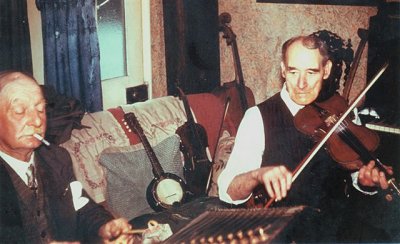 he does not seem to have got together with Walter and Daisy to play music, at least not after he was married, probably because his wife disapproved of the dance tunes, although the brothers had certainly played together when younger. Regarding Chamberlain, Chloe Paul recalls that "There was a meadow in front of our house … and he used to live at cottages at the top. I know he made them. He used to make musical instruments. Oh yeah, you could be on our front meadow there sometimes; you could hear him playing. Yes, you could," but she has no recollection at all of the brothers playing together.
he does not seem to have got together with Walter and Daisy to play music, at least not after he was married, probably because his wife disapproved of the dance tunes, although the brothers had certainly played together when younger. Regarding Chamberlain, Chloe Paul recalls that "There was a meadow in front of our house … and he used to live at cottages at the top. I know he made them. He used to make musical instruments. Oh yeah, you could be on our front meadow there sometimes; you could hear him playing. Yes, you could," but she has no recollection at all of the brothers playing together.
Walter was adept at picking up tunes by ear, and delighted in medleys of tunes, effortlessly moving from one tune to the next, often in a long string of them. This was particularly true with polkas and hornpipes, where new tunes were more or less created from snatches of others, and popular song tunes interspersed with the dance tunes, as in a remarkable medley where he starts with a polka (the tune used for The Dot Polka dance), moves effortlessly into When I Was a Lad from Gilbert and Sullivan's HMS Pinafore, then into a snatch of Sailor's Hornpipe, before moving into several other bits of polkas and song tunes, before concluding with Golden Slippers. 7 This versatility was to be used to good effect whilst playing with the other visiting musicians in the music sessions that became the English Country Music recordings.
7 This versatility was to be used to good effect whilst playing with the other visiting musicians in the music sessions that became the English Country Music recordings.
As well as playing the fiddle, Walter was able to play viola, cello, double bass, various kinds of banjo, mandolin and the drums, and the house contained a huge array of different instruments, including piano and organ played by Daisy. Walter could also play the saw, as recalled by Lily Codling: "Well, you know, an ordinary hand saw; he'd get that old hand saw. Now, how he done it, I'll never know; he used to play, and bend. He could play it … But he could do it, but he didn't do them polkas on it. 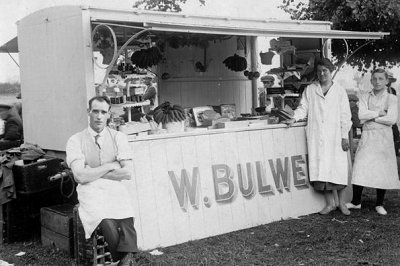 He used to do the old waltzes and things like that". He also delighted in singing comic songs such as Three Men Went Out Hunting and Little Baggy Trousers, they Need Mending.
He used to do the old waltzes and things like that". He also delighted in singing comic songs such as Three Men Went Out Hunting and Little Baggy Trousers, they Need Mending.
Shipdham is a large, spread-out village and the annual village fair, always held on the first Monday in August, gathered large crowds together, a good opportunity for the Bulwers' confectionary and ice cream business. They seem to have been involved in music making at these fairs too, at what could be a lively occasion, as Sheila Crane notes: "They used to say East End and West End; they sort of used to nearly fight each other!" Another annual event at which the Bulwers played was the New Year's Eve dance. Shelia Crane again: "See, they used to have socials; always had an Old Year's Night and a New Year's Eve one … cause they used to dance the old year out and the new year in, you see. My dad used to ring the bells here in Shipdham and they would do the same thing, ring the old year out and the new year in."
In the very early part of the Twentieth Century Shipdham had ten pubs, several others having closed in the first few years of the new century. Of these ten, six had closed by 1938. Walter claimed to Reg Hall that he had played in all of these, sometimes with another player, Fiddler Brown. If that is the case, it seems to have been in his younger days, as no one spoken to recently can recall him playing in any of the village's pubs. Step dancing was very commonplace indeed, particularly in The Standard and The King's Head (known as The 'King Billy'), Lily Codling's father being a good dancer: "Well, the mouth organ my husband used to play and they got up on the table and done it. They used to have round tables with big old heavy legs on them. They used to get my father up, when he'd had a beer or two, get him on the table. He never fell off! He used to stand and tap dance. Sounded lovely! Such a lovely rhythm". However, the Bulwers do not seem to have been involved in the music making for this step dancing.
Walter and Daisy seem to have played across the middle years of the Twentieth Century mainly as part of the Time and Rhythm dance band. As well as playing regularly in the village at the venues previously mentioned, they were in demand for dances in village venues and country houses all across the area, such as at Letton Hall, where they played for royalty, as remembered by Tony Chilvers: "Well, yes, cause that was a big hall … General Gordon had that … when Edward VII used to come down here, when they used to have these shoots, them ol' shootin' parties, y'see; they played at them, didn't they?" Certainly the only dance band in Shipdham, their influence was wide, with engagements across a large area. However, there were other bands in the immediate area, as Lily Codling played with both the Cranworth Dance Band and Bert Panthorpe's Band of Dereham, for example. Also, interestingly, amongst the Bulwer ephemera at Gressenhall Museum is an undated poster advertising a fancy dress dance at Shipdham Assembly Rooms with the 'special engagement of Cecil Harley's London Dance Band' which came from their house. Clearly the Time and Rhythm Band wasn't the only one engaged to play in the village across the time of its existence, although how common visiting bands from outside were is impossible to guess.
The Bulwers retired from playing in public regularly in the mid fifties, when they were in their late sixties. However, they continued to play at home and many people in the village recall walking past their house in an evening, to hear them playing together in their front room, the 'Best Room', where all the instruments were kept. One person who knew them well at this time of their lives was Tony Chilvers, a regular visitor whilst a schoolboy and son of the licencees of The King Billy: "I know when I used to go to school she used to like Lemon Hart rum. When I went to primary school, I used to come home for my dinner every day … used to take this bottle of Lemon Hart rum, y'see, into the classroom; put it beside my desk. Well, Headmaster Parry, he said, "Tony, why have you brought a bottle of rum to school?" "That's going to Mrs Bulwer's after school". Well, you never thought nothing about it, did you?"
Walter died in 1968, aged 79. Daisy continued to live in the house. Tony Chilvers recalls visiting her when she was very old: "When I first went to work, when after Walter died, I still used to go down … I know I used to go up there and she'd have Top of the Pops so blooming loud and I used to knock on that window … trying to make her hear was unbelievable". Daisy died in 1974, aged 86. Both are buried in an unmarked plot, with no headstone, in Shipdham Cemetary in Pound Green.
Still fondly remembered by those of their community and a lasting influence, through the recordings of them, on a great many musicians of younger generations, the Bulwers have left a considerable musical legacy. To quote Lily Codling on Walter's reaction to all this, "What would he feel now, he knew all this come about?"
Chris Holderness - 25.8.06
Rig-a-Jig-Jig - A Norfolk Music History Project
Sound Clips
Since writing this article more than two years ago, Daisy's family have been in contact and have filled in details of her early life which I didn't have previously:
Daisy Dora Hart was born in 1892 and came from Bradenham, a neighbouring village to Shipdham. She and her brother Herbert lived with their mother and step-father, Caroline and Amos Gage, in Woodford, Essex, at the time of the 1901 census. They later returned to Bradenham and later still moved to Shipdham in the 1920s.
Chris Holderness - 22.3.09
Notes:
1. For an account of the lives and music making of Walter and Daisy Bulwer, together with a full account of the 1960s music sessions and subsequent recordings, as well as a discussion of Walter's fiddle style, see Reg Hall's booklet notes to the English Country Music CD, Topic TSCD607.
2. Lily Codling has also referred to this dance as The Blue Dot Polka. The tune for it is that now commonly known as Walter Bulwer's Polka No1.
3. By music, Lily is almost certainly referring to her accordion rather than sheet music, a term commonplace amongst older generation Norfolk musicians.
4. When Daisy died in 1974, the house was cleared and much stuff thrown away. Some artefacts relating to their lives were given to Gressenhall Museum, but sadly the sheet music was not amongst them.
5. Many older Shipdham residents, and Lily Codling in particular, pronounce 'Bulwer' as if it were spelt 'Bulver'.
6. The book is entitled Violin Making and Adjusting, from Woodworker Series No 13, published August, 1909.
7. This recording is from Daisy Bulwer's own reel-to-reel recording of the rehearsal on 4th August 1962 of the music sessions that would eventually make up the English Country Music LP, loaned by Peter Woodcock and mastered onto CD-R by Paul Marsh, 2005. These recordings, together with the photographs and interview tapes and transcriptions, form part of the Rig-a-Jig-Jig archive of information relating to Norfolk's traditional music.
Discography:
- English Country Music, Topic TSCD607. The greatly expanded CD reissue of the original LP Record No 1.
Recorded 1959-66
Walter and Daisy with Billy Cooper, Reg Hall, Russell Wortley, Mervyn Plunkett, Scan Tester and Mr Hawkins.
- Heel and Toe, Veteran VT150CD
Four tracks: Recorded 1959-62
Walter and Daisy, with Billy Cooper and Edna Wortley.
(Two tracks also available on Veteran cassettes: I Thought I Was the Only One: Dulcimer Players From England Veteran VTVS07/08
- Rig-a-Jig-Jig: Dance music of the South of England , Topic TSCD659
(The Voice of the People Series, No 9)
Walter plays Old Mrs Cuddledee on the mandolin-banjo and a medley of hornpipes on the fiddle, recorded 1959
- We've Received Orders to Sail, Topic TSCD662
(The Voice Of The People Series, No 12)
Walter plays The Sailor Cut Down in his Prime on the fiddle.
- Scan Tester: I Never Played to Many Posh Dances, Topic LPs 12TS455/6 and Veteran cassettes VTVS03/04
Three tracks: Recorded 1966
Walter and Daisy with Reg Hall and Scan Tester.
Article MT185
Site designed and maintained by Musical Traditions Web Services Updated: 22.3.09

 Daisy Dora Hart came from the neighbouring village of Bradenham, was born about 1892 and is described in the census as aged 8 in 1901. Hart is a very common surname in Norfolk and it is difficult to be absolutely sure who her family might have been. Of the Harts who were living in Bradenham in 1901, Mary Ann (53) and George (52; described as 'farmer') are the only likely people to have been her parents, but there are also Ellen (18 - 'domestic servant'), Katherine A (5) and Dorothy (5 months), as well as Sidney (23 - 'farmer's son'), Herbert (16 - 'yardman on farm'), George W (36 - 'journeyman baker'), William (62), Walter (17), Herbert H (16) and George (60), all described as 'agricultural workers', and George (32 - 'teamman on farm'). Even in that age of prolific child-bearing, it seems unlikely that Mary Ann was the mother of baby Dorothy, but she may well have been Daisy's. To confuse matters further, at least one Shipdham resident is convinced that Daisy was an orphan.
Daisy Dora Hart came from the neighbouring village of Bradenham, was born about 1892 and is described in the census as aged 8 in 1901. Hart is a very common surname in Norfolk and it is difficult to be absolutely sure who her family might have been. Of the Harts who were living in Bradenham in 1901, Mary Ann (53) and George (52; described as 'farmer') are the only likely people to have been her parents, but there are also Ellen (18 - 'domestic servant'), Katherine A (5) and Dorothy (5 months), as well as Sidney (23 - 'farmer's son'), Herbert (16 - 'yardman on farm'), George W (36 - 'journeyman baker'), William (62), Walter (17), Herbert H (16) and George (60), all described as 'agricultural workers', and George (32 - 'teamman on farm'). Even in that age of prolific child-bearing, it seems unlikely that Mary Ann was the mother of baby Dorothy, but she may well have been Daisy's. To confuse matters further, at least one Shipdham resident is convinced that Daisy was an orphan.
 Lily Codling, the only surviving member of the Time and Rhythm band, who played with them as a teenager, recalls that, "We did have some good times. The best times we used to have really was at the garage where Ponder're now got (then Riseborough's). There was an upstairs room there; we used to go up there and play. And his favourite really was In And Out the Windows … We used to start off with a polka, The Dot Polka,
Lily Codling, the only surviving member of the Time and Rhythm band, who played with them as a teenager, recalls that, "We did have some good times. The best times we used to have really was at the garage where Ponder're now got (then Riseborough's). There was an upstairs room there; we used to go up there and play. And his favourite really was In And Out the Windows … We used to start off with a polka, The Dot Polka,  And as regards to telling you the yarns, well, I'll leave it to you to decide what yarns he used to tell!" This jokiness was evident in public performances too. Two postcard sized dance band advertisement cards have survived, on the back of each is a long list, in Walter's handwriting, of first lines and aide memoirs of jokes and funny tales, presumably told at certain times of the evening, between tunes and dances. Also, as Lily Codling remembers: "But plenty of times, Daisy used to play with her old wool tammy on. Walter used to get the old violin stick and poke her hat. "Walter, stop it now!" And he used to look around, because he was a humorous old boy. Oh yes, he was lovely."
And as regards to telling you the yarns, well, I'll leave it to you to decide what yarns he used to tell!" This jokiness was evident in public performances too. Two postcard sized dance band advertisement cards have survived, on the back of each is a long list, in Walter's handwriting, of first lines and aide memoirs of jokes and funny tales, presumably told at certain times of the evening, between tunes and dances. Also, as Lily Codling remembers: "But plenty of times, Daisy used to play with her old wool tammy on. Walter used to get the old violin stick and poke her hat. "Walter, stop it now!" And he used to look around, because he was a humorous old boy. Oh yes, he was lovely."
 "And I can see her now! Her old mac she had on, that had a band; when she took the cash bag off, the old mac had seen so many storms, and when she took that off that left that band around the waist."
"And I can see her now! Her old mac she had on, that had a band; when she took the cash bag off, the old mac had seen so many storms, and when she took that off that left that band around the waist."
 Another line was in ice cream and sweets, prompting a young Lily Codling to be a regular visitor: "He had a little old shop in the village, you see. His house, there was a little shop there. But all for a penny. Oh, you could go and get bagfuls. But I did spend a lot of time down Mr Bulwer's
Another line was in ice cream and sweets, prompting a young Lily Codling to be a regular visitor: "He had a little old shop in the village, you see. His house, there was a little shop there. But all for a penny. Oh, you could go and get bagfuls. But I did spend a lot of time down Mr Bulwer's  A man of many talents, Walter was also very skilled with fretwork and may well have repaired instruments regularly, as a book on violin making and repairs once belonging to him forms part of the collection of Gressenhall Farm and Workhouse museum of local rural life.
A man of many talents, Walter was also very skilled with fretwork and may well have repaired instruments regularly, as a book on violin making and repairs once belonging to him forms part of the collection of Gressenhall Farm and Workhouse museum of local rural life. he does not seem to have got together with Walter and Daisy to play music, at least not after he was married, probably because his wife disapproved of the dance tunes, although the brothers had certainly played together when younger. Regarding Chamberlain, Chloe Paul recalls that "There was a meadow in front of our house … and he used to live at cottages at the top. I know he made them. He used to make musical instruments. Oh yeah, you could be on our front meadow there sometimes; you could hear him playing. Yes, you could," but she has no recollection at all of the brothers playing together.
he does not seem to have got together with Walter and Daisy to play music, at least not after he was married, probably because his wife disapproved of the dance tunes, although the brothers had certainly played together when younger. Regarding Chamberlain, Chloe Paul recalls that "There was a meadow in front of our house … and he used to live at cottages at the top. I know he made them. He used to make musical instruments. Oh yeah, you could be on our front meadow there sometimes; you could hear him playing. Yes, you could," but she has no recollection at all of the brothers playing together.
 He used to do the old waltzes and things like that". He also delighted in singing comic songs such as Three Men Went Out Hunting and Little Baggy Trousers, they Need Mending.
He used to do the old waltzes and things like that". He also delighted in singing comic songs such as Three Men Went Out Hunting and Little Baggy Trousers, they Need Mending.